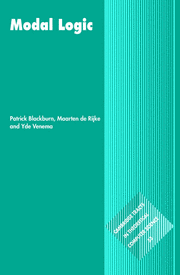Book contents
- Frontmatter
- Dedication
- Contents
- Preface
- 1 Basic Concepts
- 2 Models
- 3 Frames
- 4 Completeness
- 5 Algebras and General Frames
- 6 Computability and Complexity
- 7 Extended Modal Logic
- Appendix A A Logical Toolkit
- Appendix B An Algebraic Toolkit
- Appendix C A Computational Toolkit
- Appendix D A Guide to the Literature
- References
- List of Notation
- Index
6 - Computability and Complexity
Published online by Cambridge University Press: 05 July 2014
- Frontmatter
- Dedication
- Contents
- Preface
- 1 Basic Concepts
- 2 Models
- 3 Frames
- 4 Completeness
- 5 Algebras and General Frames
- 6 Computability and Complexity
- 7 Extended Modal Logic
- Appendix A A Logical Toolkit
- Appendix B An Algebraic Toolkit
- Appendix C A Computational Toolkit
- Appendix D A Guide to the Literature
- References
- List of Notation
- Index
Summary
In this chapter we investigate the computability and complexity of normal modal logics. In particular, we examine the computability of satisfiability problems (given a modal formula ø and a class of models M, is it computable whether ø is M-satisfiable?) and validity problems (given a modal formula ø and a class of models M, is it computable whether ø is valid on M?). When the answer is ‘yes’, we probe further: how complex is the problem — in particular, what resources of time (that is, computation steps) or space (that is, memory) are needed to carry out the required computations? When the answer is ‘no’, we pose a similar question: how uncomputable is the problem? There are vast differences in the complexities of modal satisfiability problems: some are no worse than the satisfiability problem for propositional calculus, while others are highly undecidable.
This chapter has two main parts. The first, consisting of the five sections on the basic track, introduces the basic ideas and discusses modal (un-)decidability. Three techniques for proving decidability are discussed (finite models, interpretations in monadic second-order theories of trees, and quasi-models and mosaics) and undecidability is approached via tiling problems. In the second part, consisting of the last three sections of the chapter, we examine the complexity of some key modal satisfiability problems. These sections are on the advanced track, but the initial part of each of them should be accessible to all readers.
- Type
- Chapter
- Information
- Modal Logic , pp. 332 - 412Publisher: Cambridge University PressPrint publication year: 2001

